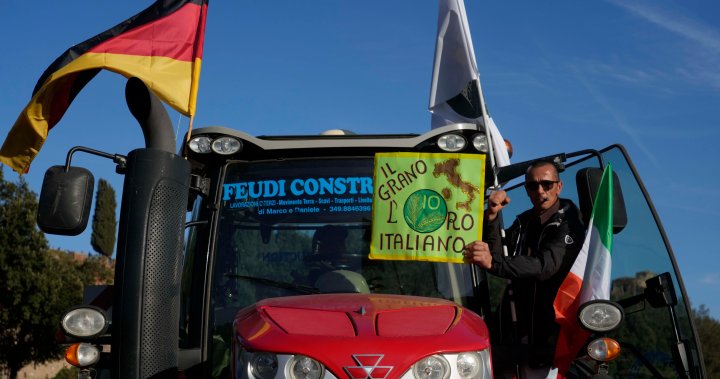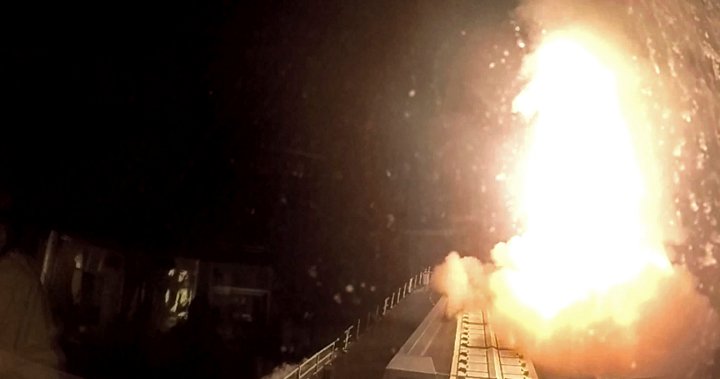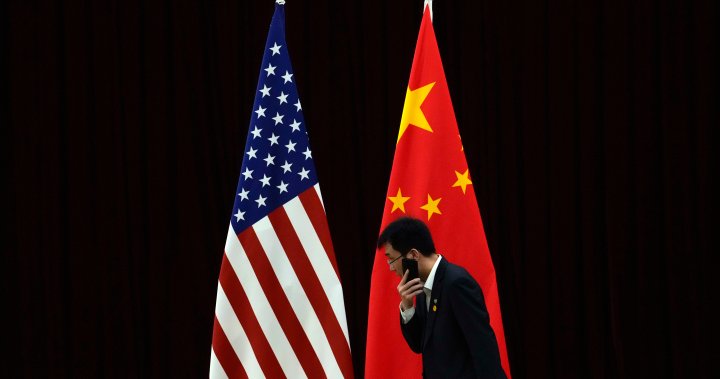In Poland, farmers pelted the European Union building with eggs.
In Belgium, hundreds of tractors blockaded one of the continent’s busiest ports.
“I’m a small farmer, I’m 18 years old, and I don’t know how life will turn out for me later on,” said Mattia Buzzone, a Sicilian farmer, at a protest in Rome, Italy.
European farmers have marched and driven tractors through many capital cities in recent weeks.
There is no single cause for the protests. The EU is made up of 27 countries and each state, along with the overarching EU Parliament, can address its own challenges and impose its own solutions.
Broadly speaking though, European farmers are upset about how costs have risen while profits have fallen, two experts told Global News.
Partially to blame, experts also said, are policies designed to mitigate climate change (which drive up costs), as well as the belief decisionmakers aren’t listening to farmers.
So, could the protests spread to Canada?
“A confluence of factors” are fueling the protests, said Tristan Skolrud, an agriculture and resource economics professor at the University of Saskatchewan.
In Germany, he said the biggest issue is the removal of a diesel fuel subsidy whereas in Eastern Europe, it’s that farmers are being undercut by cheaper imports from Ukraine.
Get the latest National news.
Sent to your email, every day.
Some French farmers take issue with a EU proposal to have four per cent of their fields lie fallow — i.e. not be farmed — on a rotating basis to help preserve biodiversity.
The EU stretches from the Arctic Circle to the Mediterranean and from the Atlantic Ocean to the Black Sea. The challenges member countries face can be myriad and so can the solutions — and rules — each state imposes, along with the encompassing supra-national bodies.
Speaking from Saskatoon, Skolrud said those requirements can build up and farmers feel they’re overregulated.
“There’s this overarching sense that (the) EU farmers are at a competitive disadvantage because (they) have to deal with so many regulations, yet you’re importing food from these countries that don’t have to deal with these regulations.”
On top of the different policies, said Katja Hoyer, a researcher and visiting research fellow at King’s College London, farmers generally believe policymakers aren’t listening to them.
“There’s a general sense of the detachment,” she said, speaking from Norfolk in the U.K.
“And that is partially because it’s an EU thing and people feel Brussels (where the EU Parliament sits) is detached from the issues and the individual countries.
“People feel that there really isn’t an authentic voice for farming.”
Canadian farmers are seeing a fall in profits and rise in costs — and politicians’ alleged lack of understanding resonates with some producers, according to Stephen Vandervalk, a vice-president of the Western Canadian Wheat Growers Association.
“(The Liberal Government) doesn’t really have any representation in rural Canada, right across the country,” Vandervalk said from Fort Macleod, Alta.
But there are differences, Skolrud told Global News.
First, the level of regulations don’t match. Skolrud said the rules European producers deal with are “the orders of magnitude” greater than Canadians.
“When you look at things relative to the types of regulations that EU farmers are facing, it’s not even in the same ballpark.”
Vandervalk agreed — even calling some of the European requirements “crazy.”
On top of that, the EU backed down on a major climate change promise.
European lawmakers had proposed to cut back greenhouse gas emissions by 90 per cent on 1990 levels by 2040, and to cut 100 per cent emissions by 2050. That plan would have required sharp restrictions on the agricultural community.
But last week, the EU removed the proposal.
Some farmers are continuing to protest, but over national policies and not broader EU issues (or at least, not that one).
Vandervalk said farmers now are focused on working with Ottawa politicians to ensure they don’t impose EU-style regulations.
“We won’t see, for a long time, what you’re really seeing in Europe,” he said, speaking of the protests.
Skolrud said the EU protests contain a lesson for Canadian politicians: that policymakers who aren’t able to satisfy the needs of the agriculture sector (whose needs are very different from other sectors) could find themselves in the same place as Brussels.
— with files from Reuters’ Lefteris Papadimas, Sudip Kar-Gupta, Alan Charlish and Anna Wlodarczak-Semczuk and Jan Lopatka.
© 2024 Global News, a division of Corus Entertainment Inc.




